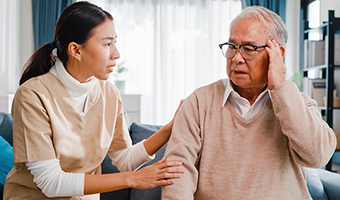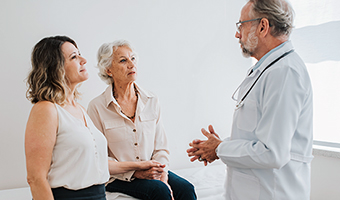How to Help Seniors Manage Headaches and Migraines
Migraines are prevalent neurological disorders that affect 39 million Americans—mostly women—according to the Migraine Research Foundation. These painful bouts can adversely impact the health and well-being of older adults and lead to increases in depression, anxiety, and sleep disturbances.
Caregivers of elderly loved ones need to understand, monitor, and manage migraine and headache symptoms closely and know when to seek medical assistance.
What is the Difference Between a Headache and a Migraine?
Headaches can cause pressure and aching in the head. Common headache types include:
- Tension headaches – triggered by stress, muscle strain, and anxiety
- Cluster headaches – severe headaches that occur on one side of the head and happen in clusters with headache-free periods in between
- Sinus headaches – often occur with allergy or sinus symptoms
Migraines also cause moderate to severe head pain but often happen on one side of the head. However, they are more than just “bad headaches.” Migraines are considered a neurological disorder and may occur with a collection of incapacitating symptoms, such as:
- Sensitivity to light or sound
- Nausea and vomiting
- Pain in the temples
- Pain behind one eye or ear
- Temporary vision loss
Some people with migraines experience a sensation—called an “aura”—before they develop a migraine. These sensations may include:
- Feelings of “brain fog” or confusion
- Seeing spots, unusual lines, or flashing lights
- Tingling or numbness in the face or hands
- Unusual sense of smell, taste, or touch
When are Headache Symptoms Serious in Seniors?
A sudden, severe headache could indicate a serious problem, such as a brain aneurysm or stroke. It is critical to seek immediate medical attention if your senior loved one has a headache accompanied by:
- Seizures
- Extremely painful or stiff neck
- Pain made worse by coughing, sneezing, or movement
- Any other unusual or alarming symptoms
Managing Headache and Migraines in Seniors
If your older loved one is experiencing throbbing headaches, you can do the following to help them manage their condition:
- Keep a headache journal
A headache journal enables you to track your senior’s symptoms, including when and what they were doing before the headache occurred as well as any dietary changes and possible triggers. If your senior cannot track their headaches themselves, a qualified home care professional will help them complete the journal.
- Get the correct diagnosis
A self-diagnosed tension headache could be a migraine, so it’s essential to consult a physician to get the correct diagnosis. A physician will review symptoms to determine the type of headache. An accurate diagnosis will help your loved one can get the proper treatment sooner.
- Identify triggers
Keeping a journal and reviewing it with a physician may provide clues about what might be triggering your older loved one’s headaches or migraines. Common triggers include:
- Weather changes
- Caffeine
- Alcohol
- Sleep patterns
- Stress
- Anxiety
- Strong smells
- Bright lights
- Loud noises
- Dehydration
Home Care Can Help Seniors With Headaches and Migraines
A qualified in-home caregiver from Visiting Angels can help your older loved one avoid triggers by:
- Monitoring symptoms
If your older loved one experiences a migraine aura, an in-home caregiver can keep an eye out for early symptoms and remind your senior to follow their treatment protocol. The caregiver will also let you know if the headaches are getting worse or more frequent. If symptoms are severe or sudden, an in-home caregiver can call for immediate medical assistance.
- Following the treatment plan
Managing your senior’s headaches may require medication, lifestyle changes, or both — and your senior may need help following a treatment plan. An in-home caregiver will remind your senior to take medications appropriately and on time, ensure that your senior is getting enough rest and fluids, manage triggers, and promote a calming environment.
If your senior has headaches, there are ways to improve their quality of life — even when you can’t be there to help. A compassionate personal care professional will become familiar with your senior’s condition to manage trigger exposure and watch for symptoms. Your senior’s caregiver will also remind them to follow their prescribed treatment plan and provide you with a status of their well-being.
Our Visiting Angels’ care coordinators are available to discuss your loved one’s home care needs—including headache and migraine management—via a free care consultation.













